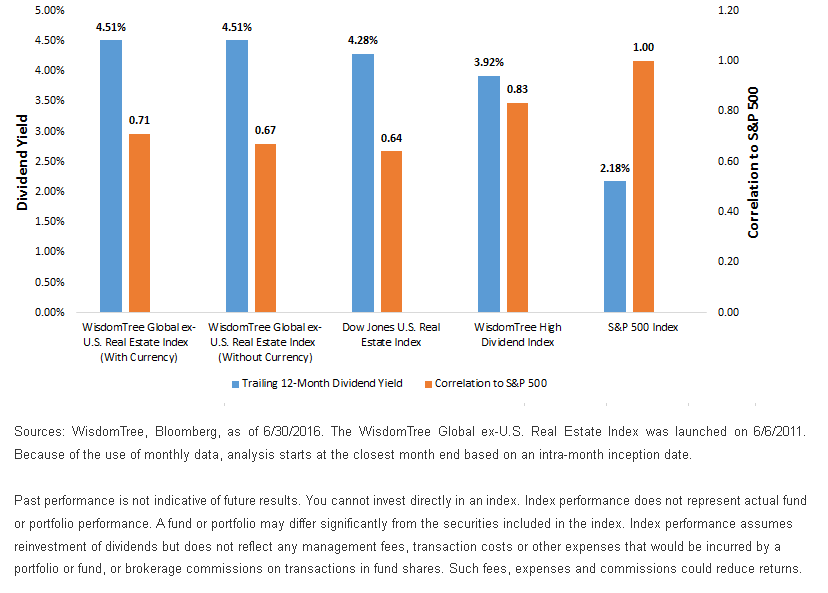Global Real Estate and Global Income



 For definitions of indexes in the chart, visit our glossary.
High Dividend Yields with Low Correlations to U.S. Equities
As the chart above shows, the WisdomTree Global ex-U.S. Real Estate Index exhibited a higher dividend yield than the S&P 500 Index, the WisdomTree High Dividend Index and even domestic real estate as measured by the Dow Jones U.S. Real Estate Index, as of June 30, 2016. This was achieved by selecting real estate investment trusts, real estate development companies and real estate operating companies from both the developed and emerging worlds and weighting them based on the dividends they paid in the prior year.2 By concentrating on these stocks outside the United States, the WisdomTree Index was able to generate a 13% return year-to-date, 710 basis points (bps) greater than the MSCI AC World ex-US Index and 77 bps higher than the return generated by the Dow Jones U.S. Real Estate Index3 over the same period. We estimate that around 3 percentage points of the 13 percent return came from foreign currency exposure, which, during this period, added to the total return given the decline of the U.S. dollar compared to most foreign currencies in 2016.
It is worth noting that the dividends distributed in the real estate sector tap into both rental income and passive income collected by companies operating in this sector. This can contribute to the variability in income that such funds pay out in any given year.
One way to broadly measure such diversification is by comparing correlations to the U.S. equity market, represented here by the S&P 500 Index. As shown above, the real estate Indexes show lower correlation to the S&P 500 than even the WisdomTree High Dividend Index, WisdomTree’s lowest-correlating U.S. equity Index over the last five years. We also note that neutralizing the effects of currencies on the WisdomTree Global ex-U.S. Real Estate Index lowered the correlation to the S&P 500 even more. For this reason, WisdomTree believes the currency-hedged version has the potential to lower volatility over time, compared to an unhedged exposure.
Conclusion
For investors looking to tap into an alternative source of income while also diversifying their portfolios, we believe dividend weighting real estate stocks outside the U.S. is an attractive option. DRW provides this exposure in an unhedged format. For investors looking to mitigate the impact of foreign currency, WisdomTree also offers HDRW, which tracks the same underlying Index of stocks but in a currency-hedged manner.
1Source: Bloomberg, as of 8/17/16. The FTSE EPRA/NAREIT United States Index and the FTSE EPRA/NAREIT United States Index were used to estimate amount of global real estate market capitalization.
2This includes real estate companies in these categories classified as passive foreign investment companies (PFICs).
3Source: Bloomberg, as of 8/19/2016. The WisdomTree Global ex-U.S. Real Estate Index (with currency) returned 12.79%, the MSCI ACWI ex-U.S. Index returned 5.69% and the Dow Jones U.S. Real Estate Index returned 12.02% YTD.
For definitions of indexes in the chart, visit our glossary.
High Dividend Yields with Low Correlations to U.S. Equities
As the chart above shows, the WisdomTree Global ex-U.S. Real Estate Index exhibited a higher dividend yield than the S&P 500 Index, the WisdomTree High Dividend Index and even domestic real estate as measured by the Dow Jones U.S. Real Estate Index, as of June 30, 2016. This was achieved by selecting real estate investment trusts, real estate development companies and real estate operating companies from both the developed and emerging worlds and weighting them based on the dividends they paid in the prior year.2 By concentrating on these stocks outside the United States, the WisdomTree Index was able to generate a 13% return year-to-date, 710 basis points (bps) greater than the MSCI AC World ex-US Index and 77 bps higher than the return generated by the Dow Jones U.S. Real Estate Index3 over the same period. We estimate that around 3 percentage points of the 13 percent return came from foreign currency exposure, which, during this period, added to the total return given the decline of the U.S. dollar compared to most foreign currencies in 2016.
It is worth noting that the dividends distributed in the real estate sector tap into both rental income and passive income collected by companies operating in this sector. This can contribute to the variability in income that such funds pay out in any given year.
One way to broadly measure such diversification is by comparing correlations to the U.S. equity market, represented here by the S&P 500 Index. As shown above, the real estate Indexes show lower correlation to the S&P 500 than even the WisdomTree High Dividend Index, WisdomTree’s lowest-correlating U.S. equity Index over the last five years. We also note that neutralizing the effects of currencies on the WisdomTree Global ex-U.S. Real Estate Index lowered the correlation to the S&P 500 even more. For this reason, WisdomTree believes the currency-hedged version has the potential to lower volatility over time, compared to an unhedged exposure.
Conclusion
For investors looking to tap into an alternative source of income while also diversifying their portfolios, we believe dividend weighting real estate stocks outside the U.S. is an attractive option. DRW provides this exposure in an unhedged format. For investors looking to mitigate the impact of foreign currency, WisdomTree also offers HDRW, which tracks the same underlying Index of stocks but in a currency-hedged manner.
1Source: Bloomberg, as of 8/17/16. The FTSE EPRA/NAREIT United States Index and the FTSE EPRA/NAREIT United States Index were used to estimate amount of global real estate market capitalization.
2This includes real estate companies in these categories classified as passive foreign investment companies (PFICs).
3Source: Bloomberg, as of 8/19/2016. The WisdomTree Global ex-U.S. Real Estate Index (with currency) returned 12.79%, the MSCI ACWI ex-U.S. Index returned 5.69% and the Dow Jones U.S. Real Estate Index returned 12.02% YTD.
Important Risks Related to this Article
There are risks associated with investing, including possible loss of principal. Foreign investing involves special risks, such as risk of loss from currency fluctuation or political or economic uncertainty.
Investments in emerging, offshore or frontier markets are generally less liquid and less efficient than investments in developed markets and are subject to additional risks, such as risks of adverse governmental regulation and intervention or political developments. Investments in real estate involve additional special risks, such as credit risk, interest rate fluctuations and the effects of varied economic conditions. Funds focusing their investments on certain sectors companies increase their vulnerability to any single economic or regulatory development. HDRW uses various strategies to attempt to minimize the impact of changes in applicable foreign currencies against the U.S. dollar, which may not be successful. Investments in derivative investments can be volatile, may be less liquid than securities and may be more sensitive to the effect of varied economic conditions. The Funds invest in the securities included in, or representative of, their Indexes regardless of their investment merit and the Funds do not attempt to outperform their Indexes or take defensive positions in declining markets. Please read each Fund’s prospectus for specific details regarding each Fund’s risk profile.
Diversification does not eliminate the risk of experiencing investment losses.
Dividends are not guaranteed, and a company currently paying dividends may cease paying dividends at any time.



